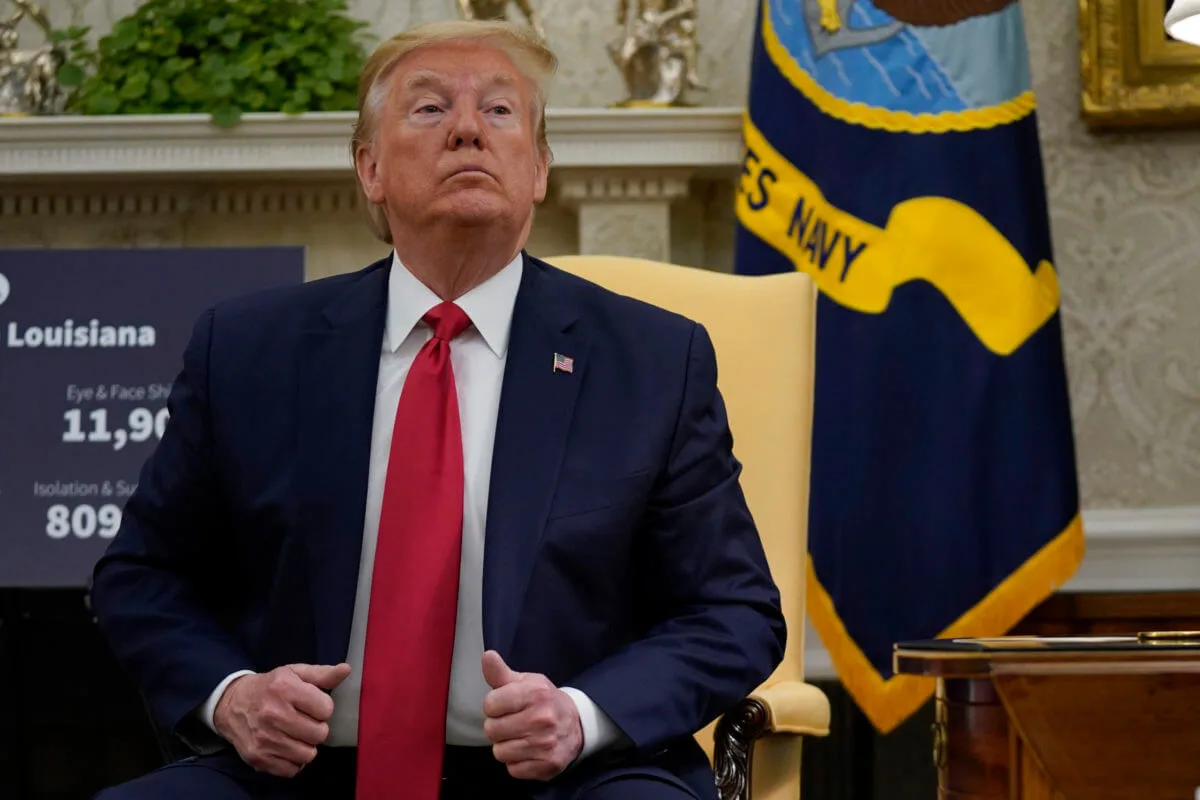
President Donald Trump attends a meeting about the coronavirus with Louisiana Gov. John Bel Edwards in the Oval Office of the White House April 29 in Washington. (AP Photo/Evan Vucci)
Immigrants rights advocates and Democratic lawmakers accused the president of using exploiting a pandemic to further his anti-immigrant agenda.
Federal aid for state and local governments could be tied to whether those governments’ immigration policies align with the Trump administration’s agenda, the president said this week.
During an exchange with reporters on Tuesday, President Trump said he was open to providing struggling state and local governments with federal relief, but only for states who took strict measures to address immigration policies in so-called sanctuary cities—localities where law enforcement authorities have limited their cooperation with federal immigration officials seeking to locate and deport undocumented immigrants.
“We’d have to talk about things like sanctuary cities, as an example. I think sanctuary cities is something that has to be brought up where people who are criminals are protected, they are protected from prosecution,” Trump said during his meeting with Florida Gov. Ron DeSantis.
There are dozens of sanctuary cities and counties across the United States, in Democratic and Republican-led states alike. Trump’s remarks that aid could be contingent upon clamping down on sanctuary cities drew significant backlash from immigrants rights advocates and Democratic lawmakers who accused the president of exploiting a pandemic to further his anti-immigrant agenda and hold badly needed funding hostage.
Trump drew similar accusations last week, after he issued a 60-day pause on issuing green cards, a policy advocates worried was a way for Trump to get closer to what they view as his endgame: a total ban on immigration.
Trump has repeatedly targeted undocumented immigrants while serving as president and has frequently directed his ire at sanctuary cities. But to be clear, undocumented immigrants have nothing to do with state and local governments’ financial issues. In fact, undocumented immigrants actually contributed an estimated $31.9 billion in taxes in 2018, including $11.8 billion in state and local taxes, according to New American Economy, a bipartisan research and advocacy organization.
Undocumented immigrants are also ineligible for nearly every federal public benefit program, which means not only do they contribute far more than they take from federal, state, and local governments, but they’re also unable to file for unemployment or receive the one-time $1,200 coronavirus stimulus checks going to most Americans.
Undocumented immigrants are also disproportionately harmed by the coronavirus’ economic fallout, as they are more likely to work in industries decimated by the pandemic, including the construction, hospitality, and restaurant and food service industries.
In reality, the reason state and local governments are suffering enormous budget shortfalls is because the coronavirus pandemic has largely shut down businesses and wrecked the tourism, retail, and hospitality industries, draining states and localities of billions of dollars in tax revenue. The pandemic has also caused an enormous surge in healthcare spending, as states have raced to address coronavirus hotspots and purchase desperately needed medical equipment and supplies.
The resulting budget shortfalls have already caused furloughs and reductions in public services across the country at a time when the Trump administration has largely tried to push responsibility for the coronavirus response onto state and local governments. Now, the administration appears to be playing games with the very funding that makes a local response possible.
RELATED: Trump Passes the Buck to States on Giving Nurses and Doctors What They Need
“Local governments were the first to respond with extraordinary measures to the pandemic – and without dedicated emergency funding for state and local aid, we will not be able to sustain our efforts,” said National League of Cities president Joe Buscaino last week. “Federal policymakers must recognize that the cost of diminished local response efforts due to budgetary constraints will be far worse for the country than the cost of stabilizing local budgets now through direct federal support.”
President Trump and top Republicans, such as Senate Majority Leader Mitch McConnell (R-KY), have argued that it’s big-spending, Democratic-run cities and states that are to blame for their budget woes. But Republican mayors and governors are also facing enormous financial issues and revenue gaps, according to a review by the Washington Post.
In total, as many as 1 million public-sector workers could lose their jobs or be furloughed, according to a new estimate from the National League of Cities. Such drastic reductions in staffing levels could affect a range of public services, including education, sanitation, and safety and health, according to local leaders.
Absent federal aid, experts believe the long-term consequences of the federal government’s refusal to provide assistance to state and local governments could turn a potentially short recession into a full-fledged, long-lasting depression.
“If you want to send the country into an extended depression, sending state and local governments into bankruptcy is a great way to do it,” a local government budget expert told the Washington Post anonymously.
RELATED: McConnell’s Refusal to Help States and Cities Could Plunge U.S. Into Depression, Experts Say
To stave off such a collapse, bipartisan leaders of the National Governors Association have asked for $500 billion in aid to state governments, while mayors and counties have called for another $250 billion in emergency assistance—measures that are supported by a broad majority of Americans. A new Politico/Morning Consult Poll released Wednesday found that 73% of American voters, including 65% of Republicans, believe it’s the federal government’s responsibility to help state governments amid the ongoing economic hardship.
Trump and McConnell initially resisted providing such help, with McConnell suggesting last week that states and cities be allowed to declare bankruptcy instead—an idea that was met with fierce backlash from members of both parties.
McConnell backtracked this week, suggesting he was open to providing aid to federal and local governments. As recently as Monday, however, Trump also opposed the idea of helping states and cities.
“Why should the people and taxpayers of America be bailing out poorly run states (like Illinois, as example) and cities, in all cases Democrat run and managed, when most of the other states are not looking for bailout help?” the president tweeted. “I am open to discussing anything, but just asking?”
The two most powerful Republicans in the nation now appear willing to consider aid for state and local governments, but only on their terms. In addition to saying he might tie aid to a crackdown on sanctuary cities, Trump said federal support would only go to states and cities that have been impacted by the coronavirus and would not address any previous issues related to mismanagement. He also said he’d require a payroll tax cut as part of any state and local bailout.
House and Senate Democrats, who have for weeks fought for relief funding for state and local governments, are all but certain to oppose the president’s sanctuary city idea, setting up a potential battle between them and Trump, with one of the most vulnerable populations in the country stuck in the middle.

School districts working with anti-LGBTQ groups can cost your kids’ schools millions
Parents across South Central Pennsylvania are worried about the potential financial impacts working with anti-LGBTQ groups may have on their school...

Opinion: Harrisburg Republicans’ Budget Surplus Flip-Flop Reveals True Priorities
Harrisburg Republicans have spent years honing a simple political strategy that could be described as oppose, pander, and negotiate in bad faith....

Central PA school board director cancels himself over gay guest speaker fallout
The Cumberland Valley School Board director resigned in protest on Monday after the board voted to reinstate Maulik Pancholy. The board originally...
No Results Found
The page you requested could not be found. Try refining your search, or use the navigation above to locate the post.



